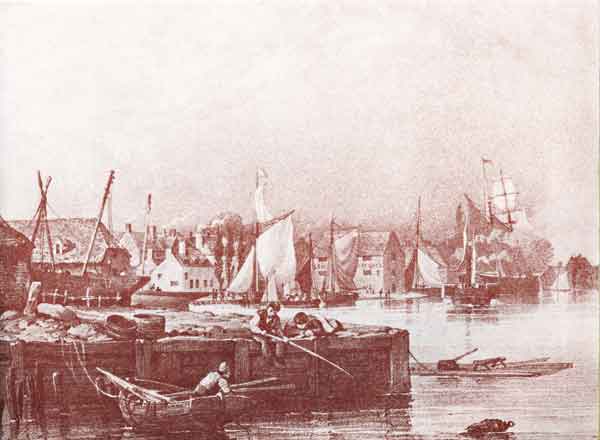
(text)
The Lymington River

Lymington Harbour about 1836
The Early Years:
Geographically, 'a drowned river valley', the Lymington estuary was
originally a tributary of the River Solent which flowed between Poole and
Chichester. Since the days of the Iron Age, Buckland Rings and Ampress
(550-100 B.C.) stand proof of the early importance of the river to which the
Romans gave the name, 'Full River.'
Some nineteen hundred years ago, the Emperor Claudius despatched his
General, Vespasian, to conquer Britain. After pacifying Kent, Vespasian
moved his legions to the Isle of Wight. Arriving at the western end of the
Island, he almost certainly crossed to the mainland from the most convenient
embarkation point which was later to become Yarmouth.
He disembarked at the Alaunian Wood (Alauna Sylva) or 'at the mouth of the
river Alainus' (Full River): almost certainly the river or creek of Limenton
(Celtic: limi = stream; ton = town). Here he attacked and reduced the
British earthwork fortress, now known as The Rings. From that desolate
battleground the view southward to the sea towards The Island, and to its
Jagged, needle-like rocks, would have been little different to that of
today; and on the slope of the hill near the river estuary, Vespasian would
have noted a settlement of British huts, clustered by the waterside: there,
too, sailing craft may have been moored to the nearby banks.
Man had not yet interfered with the course of the river which was then
wider, deeper and certainly navigable to above Ampress and probably beyond
Boldre, the tidal stream reaching as far as Brockenhurst. Lymington was a
port by the time that William the Conqueror handed the kingdom over to his
son.
Emerging from the Dark Ages, Lymington was granted its first charter in
about 1200, by the Second Earl of Devon, Baldwin de Redvers. Lymington was
one of the few English towns to have received its charter from its feudal
lord alone. At one time during the Hundred Years War (1337-1453), the Port
of Lymington provided nine ships and 159 seamen to man them; the town
rivalled Southampton in importance and certainly out-shone Portsmouth.
French marauders frequently paced our streets; in 1370, Frenchmen, after
destroying Portsmouth, burnt Newtown, Yarmouth and Lymington. In 1545,
Claude d'Annebaut, failing to provoke Portsmouth with his fleet, sailed down
the Western Solent, burning villages and farms as he progressed. Since then
Lymington has had no cause physically to repel invaders. The modern pirate
is more subtle: noise, numbers and pollution require no less energy and
subtlety to resist.